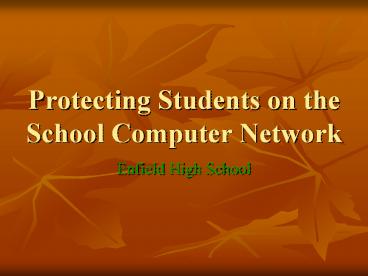Protecting Students on the School Computer Network PowerPoint PPT Presentation
Title: Protecting Students on the School Computer Network
1
Protecting Students on the School Computer Network
- Enfield High School
2
Cyber Security
- Cyber Security addresses enforcement of secure
use on the operation of computers. It is defined
by how well your computer maintains
confidentiality, integrity and availability of
information that is processed or stored on the
computer network you use. - http//www.us-cert.gov/cas/tips/
- Go to this government site for information
about cyber security.
3
General Protection to Make the School Network
Secure
- Passwords
- Connecticut Education Network
- Firewalls
- Proxy Servers
- IP Addresses
- Cookies
- Anti - SPAM
4
General Protection on the School Network
- Passwords are designed and used to keep your work
secure. - Passwords allow only people who have signed a
User Agreement to gain access to the network in
the school. - Your password should be a combination of letters
and numbers that you can remember.
5
Connecticut Education Network
- The Connecticut Education Network (CEN) is
America's first statewide K-12 (and higher
education network) to be built exclusively using
state-of-the-art fiber optic connections. - CEN evaluates Websites and will block sites that
contain inappropriate content for students.
6
Connecticut Education NetworkHow to Safely Use
the Internet
- Protect your personal information.
- Know who you're dealing with online.
- Use anti-virus software, a firewall, and
anti-spyware software to help keep your computer
safe and secure on your home machine. - Be sure to set up your operating system and Web
browser software properly, and update them
regularly. - Use strong passwords or strong authentication
technology to help protect your personal
information. - Back up important files at home and school.
- Learn what to do if something goes wrong.
- Protect all children online.
7
Firewalls
- A network firewall protects a computer network
from unauthorized access. Network firewalls may
be hardware devices, software programs, or a
combination of the two. - Network firewalls guard an internal computer
network (home and school) against malicious
access from the outside. Network firewalls may
also be configured to limit access to the outside
from internal users. - Free Personal Firewalls is a site that recommends
personal firewall sites.
8
Proxy Servers
- Proxy servers act as an intermediary between
internal computers and external networks by
receiving and selectively blocking data packets
at the network boundary. - These network firewalls also provide an extra
measure of safety by hiding internal Local Area
Network addresses from the outside Internet.
9
IP Addresses
- An IP address (Internet Protocol address) is a
unique address that computers use in order to
identify and communicate with each other on a
computer network. - This utilizes the Internet Protocol standard
which is your computer address.
10
Cookies
- HTTP cookies (sometimes known as web cookies) are
parcels of text sent by a server to a web browser
and then sent back from the browser each time it
accesses that server. - HTTP cookies are used for authenticating,
tracking, and maintaining specific information
about users.
11
Cookies
- Cookies have been of concern for internet
privacy, since they can be used for tracking
browsing behavior. - For example, Cookies show information about the
user, such as site preferences or the contents of
their electronic shopping carts.
12
Anti SPAM
- Spam is the material you receive on your computer
that you have not requested. - It is an abuse of electronic messaging systems to
indiscriminately send unsolicited bulk messages
that clog you machine and the network. - Anti Spam is either hardware or software that
limits the SPAM getting onto your machine.
13
Limiting PopUp Ads
- Pop-up ads or popups are a form of online
advertising on the World Wide Web intended to
increase web traffic or capture email addresses. - It works when certain web sites open a new web
browser window to display advertisements. - The pop-up window containing an advertisement is
usually generated by Java, but can be generated
by other means as well.
14
Do You Know
- Have you increased your knowledge about
computer security now? To test your knowledge,
try the self assessment quiz on the site below. - http//www.staysafeonline.info/content/self-assess
ment-quiz

